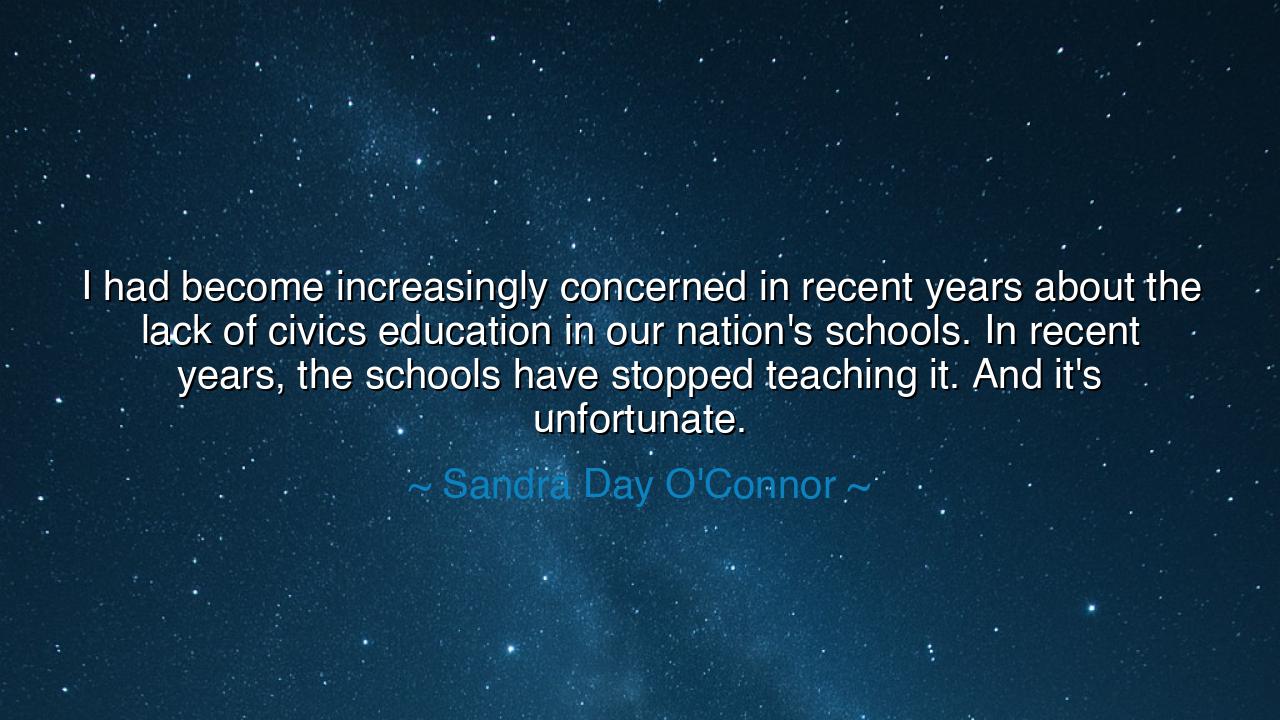
I had become increasingly concerned in recent years about the
I had become increasingly concerned in recent years about the lack of civics education in our nation's schools. In recent years, the schools have stopped teaching it. And it's unfortunate.






Sandra Day O’Connor, the first woman to serve upon the highest court of the land, raised her voice with sorrow when she declared: “I had become increasingly concerned in recent years about the lack of civics education in our nation’s schools. In recent years, the schools have stopped teaching it. And it’s unfortunate.” In these words, she did not speak as a judge robed in authority, but as a guardian of the republic’s spirit, lamenting the slow fading of a knowledge essential to freedom: the knowledge of civics, of how a people governs itself. Without such knowledge, liberty weakens, democracy falters, and a nation forgets the sacred covenant that binds it together.
The ancients knew that the strength of a city was not in its walls of stone, but in the wisdom of its citizens. In Athens, young men were taught not only philosophy and the arts of war, but also the duties of the polis, the responsibilities of citizenship, the sacred trust of voting, debating, and serving in public life. Rome, too, in its republican days, instructed its sons in the laws and structures of the state, for they understood that without civic knowledge, the people would become prey to corruption and tyranny. O’Connor, echoing these timeless truths, reminds us that the erosion of civics education is not a small loss—it is the slow unravelling of the very fabric of self-government.
Consider the story of the American Revolution. Farmers, blacksmiths, and merchants stood against the might of empire not merely with muskets, but with conviction born of civic understanding. They had read the pamphlets, studied the arguments of liberty, understood the rights owed to them under law, and knew the dangers of unchecked power. It was civics education, whether through sermons, newspapers, or tavern debates, that armed their minds before their bodies. Without such knowledge, their courage would have been blind. With it, their struggle became a conscious act of freedom.
O’Connor’s lament is therefore a warning. When schools stop teaching civics, generations rise who know not the architecture of their own government, who cannot discern the limits of power, who fail to recognize their rights and duties. Such citizens become easy prey for demagogues, for propaganda, for those who would erode liberty piece by piece. A nation may yet stand rich in technology and strong in arms, but if its people forget how to govern themselves, it will wither from within, like a mighty tree hollowed by unseen rot.
What lesson, then, must we take from her words? It is this: freedom is not self-sustaining. It requires knowledge, vigilance, and participation. Each person must be instructed in the workings of the law, the balance of powers, the rights enshrined, and the duties demanded. Without such teaching, liberty becomes a fragile shell, easily broken. With it, liberty becomes a fortress, defended not only by soldiers but by every citizen’s mind and heart.
Practical action lies before us. Parents, teach your children the meaning of the Constitution, the Bill of Rights, the stories of those who fought to preserve them. Teachers, even if civics has been removed from the curriculum, weave it into your lessons—remind students that they are not merely individuals, but citizens. And each of us, no matter our age, must take it upon ourselves to learn: read the founding documents, study the debates of the past, speak with others about the duties of citizenship. In this way, we restore what has been lost.
Thus, children of the future, remember Sandra Day O’Connor’s lament. The decline of civics education is not merely “unfortunate”—it is dangerous. If you would preserve your freedom, you must know how freedom works. If you would keep your rights, you must know where they come from. If you would remain a people of self-government, you must teach each generation to govern itself. Let this be your vow: that the chain of civic wisdom will not break with you, but will be passed on, strong and unbroken, to those who come after.






AAdministratorAdministrator
Welcome, honored guests. Please leave a comment, we will respond soon